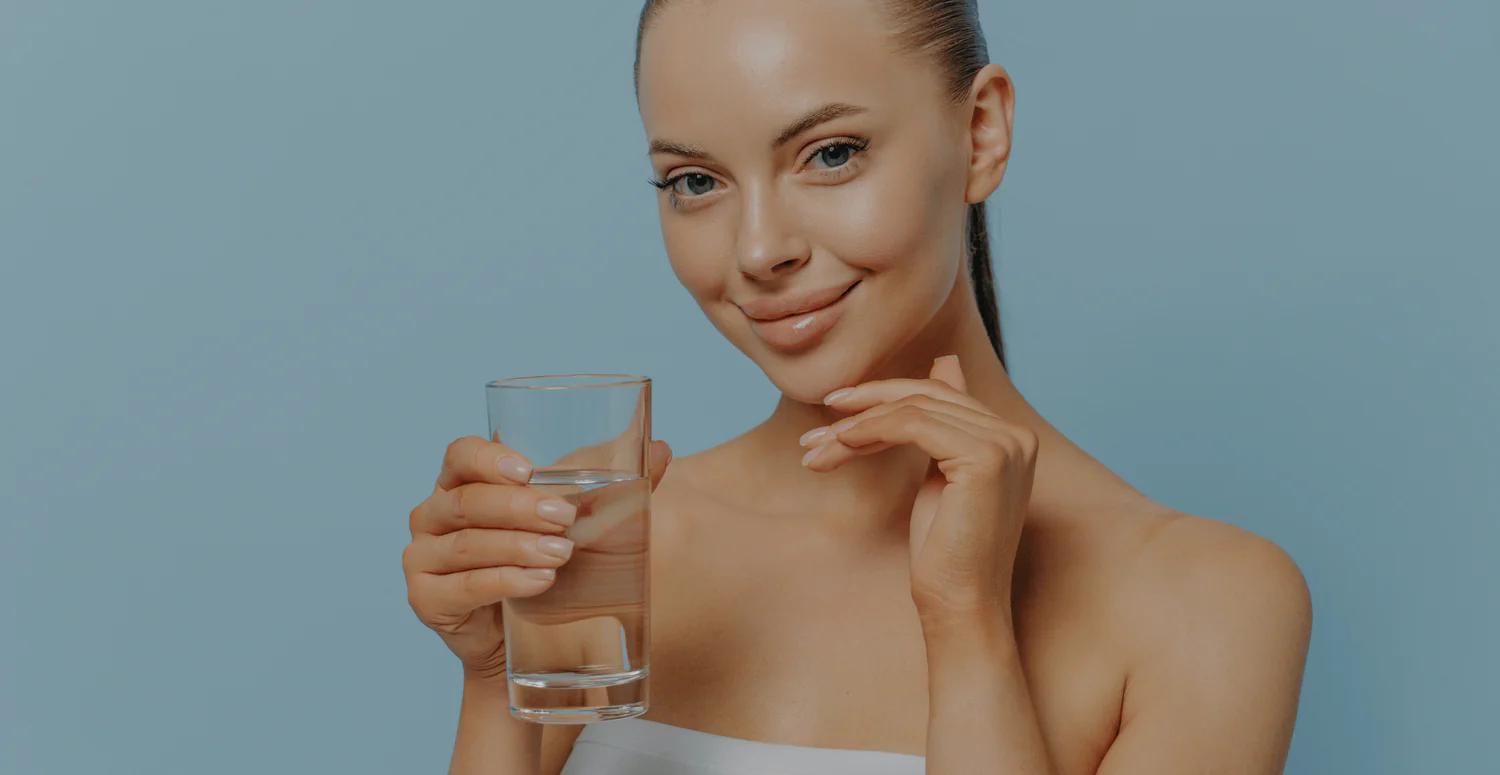Your skin needs to be hydrated to maintain its function as a barrier and proper hydration can suppress the development of clogged pores or acne.
Not only will hydrated skin be more supple, it will be better equipped to withstand the onset of fines lines and wrinkles. Drink plenty of water every day and include hydrating foods in your diet.
Water
We as a whole know about the most obvious thing you can do – drink tons of water. But you can make hydration part of your skin-care routine in easy ways. Start the day by drinking one glass of water, then carry around a water bottle with you the rest of the day and be sure to incorporate products that are designed to hydrate skin into your skin-care routine. Try a serum or a moisturiser.
When skin is hydrated, it feels soft and silky and doesn’t flake, fade or itch. If skin is hydrated, it’s less likely to be irritated, dry or sensitive. And if skin is hydrated, it’s helping your body’s natural barrier system keep your skin healthier and stronger by fending off bacteria and other environmental pollutants.
A dramatic increase in liquid intake is counterproductive; excess water can exacerbate the problem. ‘The skin becomes even more dehydrated,’ says Suozzi. ‘When you have a normal amount of fluid in your system, the skin looks fine; excessive hydration happens when you take too much fluid from the surrounding tissues, so it actually pulls fluid away from the capillary blood flow, out of the capillaries, into the spaces that hold the capillaries and the cells. That creates fluid volume, and that’s excess or an overdose of fluid because now the capillary vessel itself is all dried out, which is what causes dry skin.’ Instead of lotions, Suozzi advises a delicate balance: eat food that is naturally full of moisture, such as fresh fruits and vegetables; get adequate amounts of water, but don’t overdo it. ‘It’s important to eat right and drink right,’ she says.
Moisturizer
Those beginners who had been properly hydrated had a stronger natural barrier, which kept irritants and microbes away from the skin and therefore made sure that their bodies were more reliably protected against allergy, infection and dryness: those with a good natural barrier are less likely to develop symptoms of allergy, infection or dryness.
Hydration reduces drying and itchiness, and supports a protective shield from damaging toxins and chemicals. Finally, temperature maintains healthy pH levels needed for clean, clear skin and lustrous hair.
Proper hydration of your skin will give you youthful-looking, plump-looking, radiant skin, and even out your skin tone while reducing fine lines and wrinkles.
It means drinking plenty of water every day, and eschewing caffeinated drinks and alcohol. When you bathe or shower, slather on the moisturiser so that your skin can soak up all of this extra moisture. You might also want to turn down the temperature on your water heater–high water temperatures deplete your skin of its natural oils. In the winter, you might wish to invest in a humidifier.
Sunscreen
Sunscreen Prevents UV Damage: Sunscreen helps to keep the skin moist and prevents dryness or sunburn, and helps to prevent spots and ageing caused by the sun. Chemical sunscreens, such as octocrylene and benzophenone, absorb UVB radiation, while physical sunscreens, including titanium dioxide and zinc oxide, block out this radiation.
But hydration is no magic bullet – it’s just part of the bigger picture to keep skin healthy. In fact, it should be treated as such from the moment you apply your first face oil or spritz. For holistic skincare, it’s important to consider more than just slathering hydrating ingredients like hyaluronic acid or glycerin on the outside. Your hydration strategy should involve your diet (embracing foods with high water content), professional treatments (some, like enzyme peels and hydrafacials, cleanse, exfoliate and infuse hydrating serums into the skin, leaving you instantly glowing after a 30-minute treatment), and steering clear of products and procedures that dry or stress out your skin.
Diet
We all know that what you eat is important when it comes to our general health, but not everyone realises that the same is true for the skin.
The skin serves as a barrier to infection, regulates fluid loss, helps with the absorption of nutrients and the excretion of our body’s waste products, as well as helping us perceive the texture, pressure and temperatures of what we touch. And of course, because of its location, it plays a vibrant role in vitamin D production – something that’s important for maintaining healthy bones.
If you want to have healthy skin, it’s crucial to refrain from eating processed carb foods, sugar food and dairy. For a balanced diet, protein intake needs to be in a healthy balance by ingesting lean meats, eggs and beans; carbohydrates rich with vitamins, fibre and minerals need to be fruit and vegetables; whole grains; healthy fats from nuts and fish are also suggested; not to mention the highly recommended addition of omega-3 fatty acids, antioxidants and phytonutrients like those in avocado, olive oil, dark, leafy greens, tomatoes and berries.


